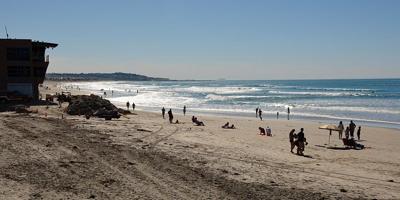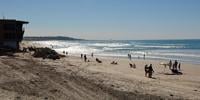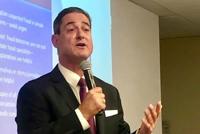
Pacific Beach, San Diego
SAN DIEGO - A federal appeals court says San Diego can’t ban yoga instructors from teaching classes on municipal beaches.
Steven Hubbard and Amy Baack sued the city, alleging a 2024 ordinance that barred teaching yoga to four or more people at beaches or shoreline parks without permission violated First Amendment protections.
U.S. District Judge Cathy Ann Bencivengo denied the teachers’ request for a preliminary injunction, which they challenged before the U.S. Ninth Circuit Court of Appeals. Judge Holly Thomas wrote the panel’s opinion, filed June 4; Judges Mary Murguia and Gabriel Sanchez concurred.
According to court records, Hubbard and Baack offer free yoga classes. Baack said park rangers met her at her usual teaching spot May 8, 2024, told her a class wasn’t allowed, returning to teach would be a criminal offense and the city doesn’t issue fitness class permits for any shoreline park. Hubbard said he got tickets for teaching yoga on May 18 and June 1 that year.
In July, Judge Bencivengo said the teachers hadn’t established how teaching yoga is “protected speech under the First Amendment,” found the San Diego ordinance to be content neutral — although it specifically addressed yogal classes — and said the city’s restrictions were appropriate as “there are other parks available” and the limits are balanced against interests of other San Diegans.
“The First Amendment protects teaching yoga,” Thomas wrote. “Because the ordinance targets teaching yoga, it plainly implicates Hubbard and Baack’s First Amendment right to speak.”
The panel noted the ordinance regulates speech by subject matter, specifically naming yoga as a service — even when provided for free or on a donation basis — and excluding yoga from a list of “expressive activity” conduct exempted from the limitations. Thomas called that framework “the very definition of a content-based restriction on speech” and said the city “made clear at oral argument that it views and treats the ordinance as a content-based restriction, conceding that the ordinance permits the teaching of subjects such as tai chi and Shakespeare at shoreline parks and beaches, while the teaching of yoga is prohibited.”
The city still insisted its “substantial government interest of preserving” parks and beaches for public use made the ordinance content neutral, but the panel rejected that argument, noting the ordinance “does not qualify as a valid time, place and manner restriction, and is presumptively unconstitutional.”
As such, Thomas continued, the panel would only uphold the ordinance if the city could show a narrowly tailored law in furtherance of a compelling interest. While the city argued yoga classes “would lead to harmful public consequences to the city’s safe and effective regulation of its parks and beaches,” and although the panel acknowledged public safety constitutes a compelling interest, Thomas noted “the city has provided no explanation as to how teaching yoga would lead to harmful consequences to these interests, or even what those consequences might be.”
The panel further said the ordinance failed by not prohibiting other types of classes, including those potentially inviting physical movement and said the city couldn’t explain why the outright ban was the least restrictive way to reach a public safety goal, especially given its other limits on large group assembly and activity subject to First Amendment safeguards but for when it blocks “safe flow of pedestrians or other traffic.”
San Diego has already designated “expressive activity areas” within municipal parks, Thomas said, but doesn’t have an explanation for why yoga classes can’t happen in such zones. The panel said Hubbard and Baack would likely prevail on the merits of their claim that the ordinance, as applied to their teaching, violates the First Amendment, and as such a preliminary junction is a suitable remedy to prevent suffering irreparable legal harm.
The panel remanded the complaint to district court with instructions to enter the injunction but did not address whether the ordinance was facially unconstitutional, finding the record underdeveloped with respect to that claim.
Hubbard and Baack are represented by Pease Law, of San Diego.
San Diego is represented by the office of City Attorney Mara Elliot.




